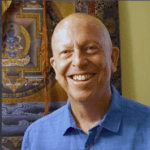When we investigate the experience of anxiety, the Western approach takes the experience itself as its starting point. What triggered the anxiety? How can we work with it? How can we make it go away?
We can never solve our lives. Life is not a thing that can be broken and then fixed. Life is a process, and we can never solve a process. We can only participate in this process, either consciously or unconsciously. We aren’t going to find the perfect formula and then coast our way through life. We can’t make pain go away, although we can reduce unnecessary suffering significantly. The more deeply we investigate, the less we can grasp or even know this apparent self that Western psychology takes as its foundation. From the Buddhist perspective, the nature of life—and of our own mind—is basically open. There is no foundation; no ground to stand on. We can consciously participate in this open nature, but we can’t know it.
We really might want to consider committing to the experience of anxiety, because it’s not going anywhere.
From this point of view, we can see that anxiety is actually a necessary part of our path. As we move in the direction of waking up, increasing our tolerance of more and more awareness or open mind, we will inevitably experience anxiety. At some point or another, anybody committed to a spiritual path may find it important to commit to the experience of anxiety as an approximation of an open state of mind.
When I say “committing to our anxiety,” I mean doing the difficult work—difficult because it goes against both our biology and our cultural conditioning—of training ourselves not to try to escape our anxious feelings. It even means to learn to appreciate them, explore them, feel them, and see for ourselves whether they are as much of a problem as we think they will be. If anxiety is not a problem and if we understand that it’s actually an essential part of our path of waking up, then we might want to practice this attitude of commitment. “I am ready to feel anxious at any second,” we might say to ourselves, “and to work with the energy of anxiety for the rest of my life. I give up my fantasy of a life free of anxiety.”
If anxiety is our egoic response to the truth of not knowing—or of openness, as I like to think of it—then we really might want to consider committing to the experience of anxiety, because it’s not going anywhere.
Giving yourself permission to feel your anxiety
If you would like to try this practice, decide which feeling you’re going to work with. Ideally you will choose an underlying issue that you really don’t like to feel—something like abandonment, shame, low self-worth, dependency, guilt, or anxiety.
Once you’ve decided on your issue, take a moment to settle in. If you’re sitting down, feel the weight of your body in the chair. Then begin to pay attention to your breath, feeling both the inhale and the exhale. Once you’re present, start dialoguing with yourself.
Say out loud, “I give myself permission to feel [this feeling that you really don’t like to feel] off and on for the rest of my life.” Accept this feeling as if it were already a legitimate part of who you are. As you invite this feeling, try to bring your attention out of any interpretation into whatever raw sensation is happening. For example, many people find that the torso is the location where they feel emotional intensity. Check it out and see if there’s any agitation there. Perhaps you feel numb from the neck down; perhaps there is some sense of tingling in your hands, or aching or fullness or lightness somewhere in your body. Perhaps the experience permeates your whole body. Or maybe you don’t have any awareness of sensations except behind your eyes. It doesn’t really matter what you discover. The point is to be willing to direct your attention toward your experience at the level of sensation.
Next, ask yourself whether this sensation you’re feeling is actually a threat in any way. Are you going to die from feeling a ball of pressure in your stomach or a hollowed-out chest or a heavy heart? Is the burning sensation in your solar plexus actually dangerous? Will the tension in your belly or your throat actually constrict you enough to kill you?
If you find that experiencing these sensations is not harmful, even if they are disturbing, then experiment with a commitment to having a relationship with these sensations, perhaps for the rest of your life. What feelings arise when you think of this? What sensations?
The point of this exercise is to see for yourself whether it is, in fact, a problem to feel the sensations you’ve organized your life around not feeling.
From Already Free: Buddhism Meets Western Psychotherapy on the Path of Liberation by Bruce Tift, published by Sounds True.

